I speak one language fluently: English. I understand enough Spanish to get myself in trouble if I wander into Tijuana. My Italian language skills have faded horribly since my grandparents passed away. But I can read subtitles. I love subtitles because they mean I’m seeing a movie not made here in Hollywood. Don’t misunderstand, I love American movies from every era. But a foreign film has a different perspective, a different reality and a different feel than American films.
There are plenty of places to go to find lists of the 50 Best Foreign films. “Yojimbo” is brilliant, “Cinema Paradiso” is a favorite of mine. The film is a love letter to movies and childhood. “Das Boot” is as gripping a film as I have ever seen. There is not enough room, here or anywhere, to list all of the foreign language movies I have seen and loved. My top ten changes constantly. So, I wrote about a dozen films I’ve seen throughout various points of my life that for one reason or another have stuck with me.
Ask me again next week, and I will probably have bumped one of these for “Shall We Dance,” or “Like Water For Chocolate.” I’m always willing to sit down and try to gauge the rhythm of the language I’m hearing and the words I’m reading and the action unfolding. This by no means a list of the best foreign films; it’s a dozen films I’m always willing to watch again that happen to be in a foreign language.
My Life As A Dog (1985)
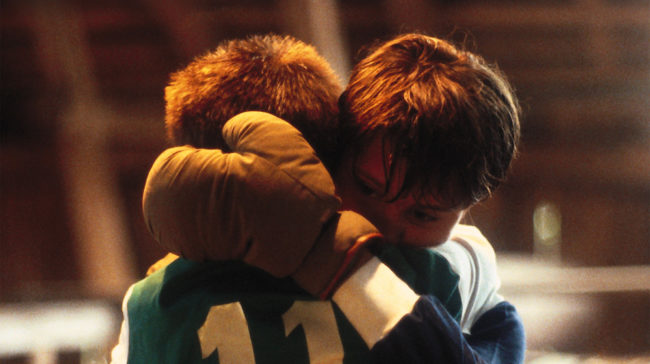
Ingemar lives with his brother and his terminally ill mother. Life is rough for Ingemar, but not as bad as it is for Laika — the dog that the Soviet’s launched into space. Director Lasse Hallström gets a great performance out of Anton Glanzelius, an actor who plays our protaganist like an average kid thrown into a situation no child should ever have to face. He gets sent away for the summer and encounters people that will have a profound effect on his life. Calling this a coming-of-age film is accurate, but it sells it short too. By the time Ingemar hears the radio broadcast of
Ingemar Johansson knocking out Floyd Patterson, you’re emotionally invested in this weird kid who obsesses about a dog in space.
Rashômon (1950)
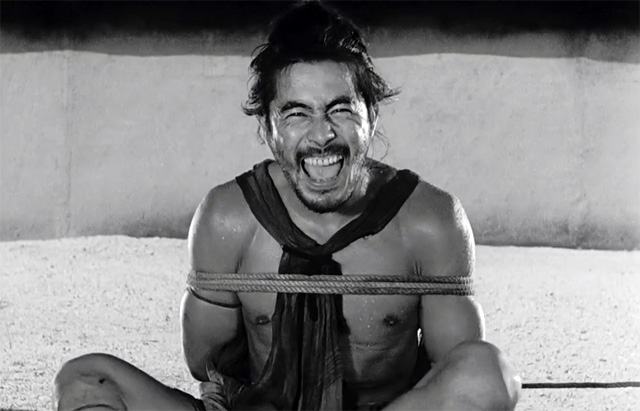
Everyone has a story to tell, but who is telling it correctly? Or is everyone telling it correctly but from a different perspective? Akira Kurosawa weaves a plot about a priest, a woodcutter and another man seeking shelter from a rainstorm in the shell of a former gatehouse called Rashômon. The priest and the woodcutter tell the tale of a murdered Samurai warrior discovered by the woodcutter three days earlier. The pair were summoned to testify at the trial along with three other witnesses. All the stories are similar, but contradict one another at the same time. Weather plays a key role in the film too. The driving rain at the beginning gives way to sunshine at the end. Kurosawa said that the film was symbolic of life. And life’s meaning was not always clear. One thing is clear, There are layers to everyone and every situation is not black and white. Rashômon is generally credited as the film that lead the Academy of Motion Picture Arts and Sciences to create the Best Foreign film category.
Goodbye Lenin (2003)
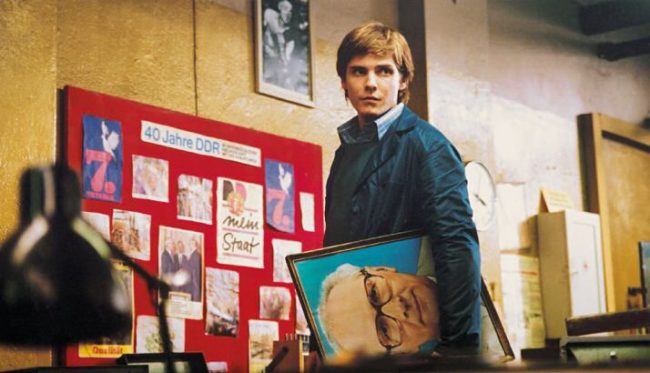
In 1989, there was rapid change in East Germany. In fact, it changed so rapidly, it ceased to exist. Daniel Bruhl is Alex, a young who protests the crumbling communist regime. His mother watches tas the police arrest him. She has a heart attack and falls into a coma. Several months later, after East Germany is absorbed back into Germany, she wakes up. Not wanting his mother to feel the shock of her reality changing, he runs through Berlin to try and find now defunct products to keep the illusion of the old East Germany still exists.
Alex gradually falls apart trying to keep up the lie for his mom, even going so far as having a former cosmonaut/cab driver to pose as the new German leader, fake newscasts to explain the Coca Cola is actually a communist product. There is even an amazing shot of the giant of head of a Lenin Statue being helicoptered down the street. In all the maelstrom of change, at its heart, “Goodbye Lenin” is a story about a guy’s love for his mother.
Belle Epoque (1992)
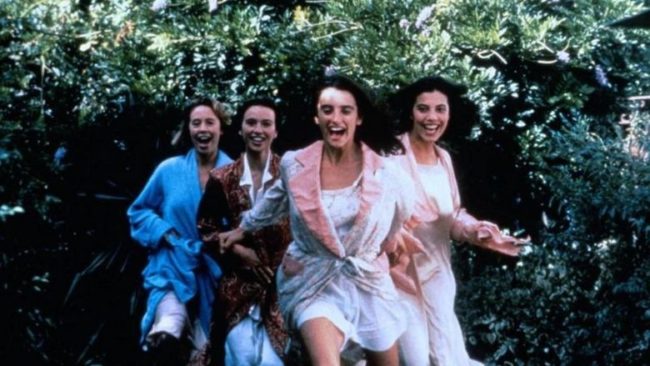
Fernando (Jorge Sanz) is an unwilling soldier caught in the Spanish Civil War. He deserts and stumbles upon a farm as he runs from the conflict. He is welcomed by the anarchist farmer, Manolo (Fernando Fernan Gomez, who is nothing short of great). Manolo is also the father of four daughters, Rocio, Violeta, Clara and Luz, all of them lovely and interested in Fernando. He is interested in all of the too. He ends up bedding all four, including Violeta, who happens to be a lesbian. It’s Carnivàle, Fernando is dressed as a woman… you fill in the blanks.
Gorgeous scenery is filmed as though it’s an extra character. Pre-Hollywood Penelope Cruz plays the youngest sister, Luz. Maribel Verdu plays Rocio, the more traditional sister who wants to get married to the local rich boy, Juanito. Juanito is equal parts opportunistic sleaze and momma’s boy. Fernando Trueba directs “Belle Epoque” with a hands-off approach. Scenes unfold and play out naturally. The dialogue does not seem forced, the cast works well together and the messages seems to be that everyone’s family may be screwed up, but Manolo and his daughters might
have that titled all sewn up.
Breathless (1960)
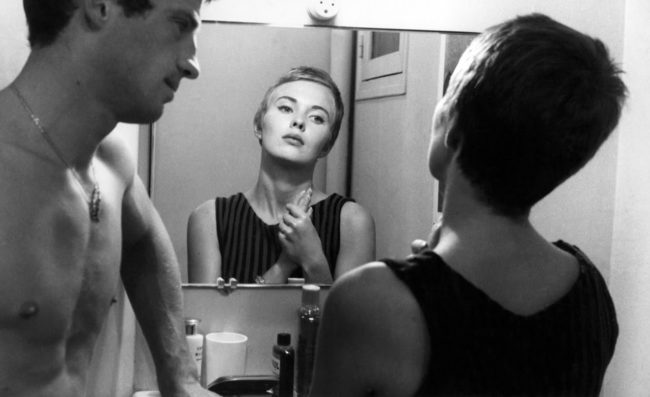
Director Jean-Luc Godard said you only need two things to make a film, a girl and a gun. In Breathless, he used both to perfection. Petty thug Michel Poiccard is played by Jean-Paul Belmondo as if psychotic, small time criminals were charming as hell. He steals a car, panics and murders a motorcycle cop and has to get out of Paris. As he gets ready to make a run for it, he meets up with his girlfriend, Patricia Franchini, an American girl studying journalism at the Sorbonne. Franchini is played by Jean Seberg who is pure iconic beauty with her pixie cut, disarming
smile and playful demeanor. The plan to flee to Italy is doomed to fail, Poiccard’s face is plastered all over town and on the front page of every newspaper. He seems oblivious to the dragnet closing in around him and the window to escape closes.
Hailed as one of the first films of the “nouvelle vague,” “Breathless” helped put French filmmaking on the map. The jump cuts that were new and innovative happened when Godard had to shorten the film by 30 minutes. Rather than excise full screens, he made slight edits everywhere and a style of editing was born.
Stalker (1979)
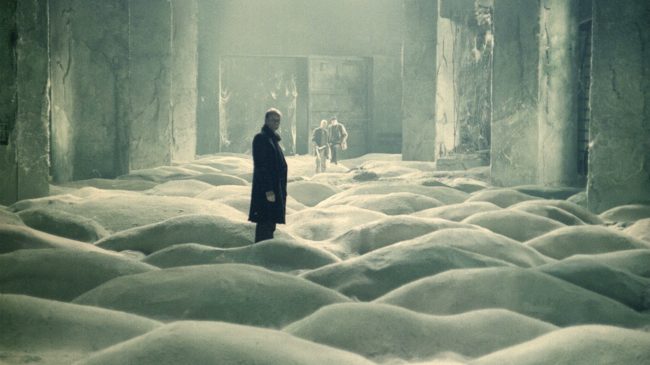
There’s a creepy vibe that runs through Stalker that you’re the one being watched in this paranoid film by Andrey Tarkovskiy (or Andrei Tarkovsky depending on who does the translating.) A Stalker is someone with mental powers that can lead you to the Room inside the Zone where your wildest dreams can come true. A man takes his daughter to the Stalker to risk prison or death to get to the Room. He does this over his wife’s protests. Long views of beautiful shots are something of a trademark for Tarkovsky. The man seems to love long takes. Here they work because they add to the unsettling feel of the film.
The Zone is a bizarre and desolate land where the rules seem to change the closer you get to the Room. The Zone was inspired by a nuclear accident that took place near Chelyabinsk in 1957. Several hundred square miles were affected by the nuclear fallout and abandoned. As is standard with Tarkovsky films, there is religious symbolism everywhere, some subtle, some obvious. It’s an alternate reality, where the police officer’s AT helmet insignia is the same as the logo on the cigarettes the wife smokes. Both are a nod to the director’s initials.
Delicatessen (1991)
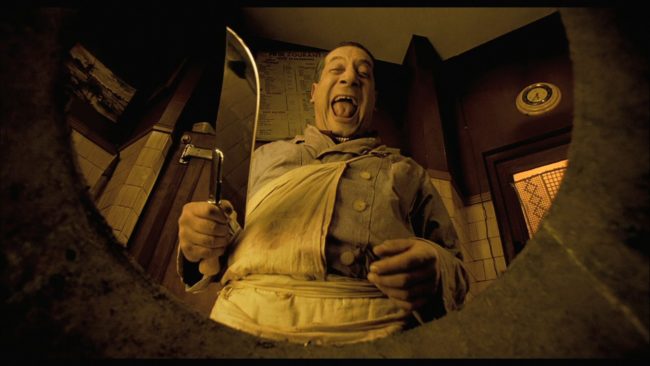
A post-apocalyptic society where food is rare and more valuable than gold, and so it has become the currency. In the middle of this hellscape is an apartment building with a delicatessen on the ground floor. Due to a mysterious disappearance of the building’s maintenance man, a former clown lands the job. The cast are a quirky bunch of odd balls, including a comically suicidal tenant. The deli and the building is owned by the local butcher, who always seems to have a fresh supply of meat. The butcher’s daughter falls in love with the clown and tries to stop her father’s evil ways by contacting the troglodytes, or trogs, plant and grain eaters who make up the vegetarian underground. Directed by Marc Caro, Jean-Pierre Jeunet with a dark eye for laughs and some unsettling cinematography, “Delicatessen” works on multiple levels.
Wedding Banquet (1993)
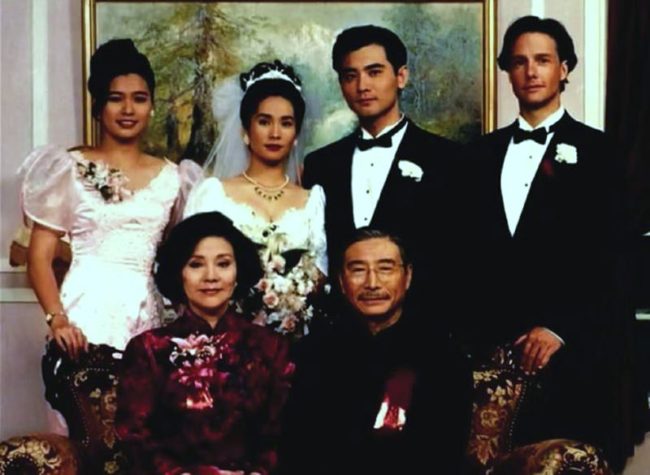
Simon (Mitchell Lichtenstein) and Wei-Tung (Winston Chao) are a cross-cultural gay couple living a comfortable life in Manhattan. Their families would not approve of the lifestyle, so the pair comes up with a plan; Wei-Tung will marry an immigrant who needs a green card. When his parents come to the New York for the wedding, they insist on throwing a traditional and elaborate banquet. Director Ang Lee is in fine form, before he became a household name stateside. There’s no explosions, no CGI and no huge green dude here, Lee would get to those later – this is just a sweet, funny, romantic story of generations colliding with one another.
At a cost of $1million, “The Wedding Banquet” was the most profitable film of the year. Chao had never acted in a film before, and he turns in a solid performance as a man in love and a man who wants to avoiding hurting his family (and also having to experience the hailstorm of emotional baggage that would rain down if his family found out). Earning $23.6 million, which gave it a cost-to-return ratio of 23.6, considerably higher than 1993’s biggest money maker “Jurassic Park,” with a ratio of 13.8.
Jesus of Montreal (1989)
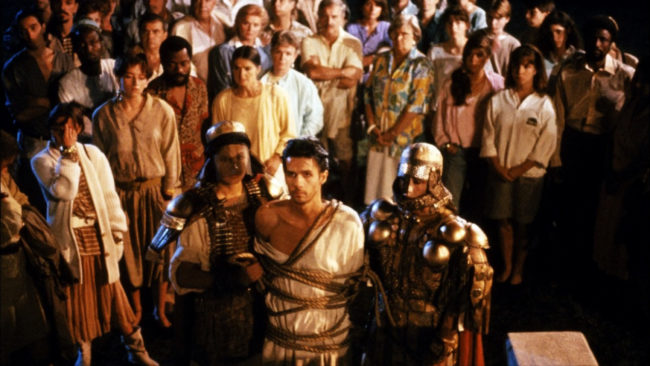
French Canadian cinema is not exactly legendary. There are times, however, when Montreal produces something amazing. Jesus of Montreal is one of those times. The annual Passion Play in the Montreal Basilica has been produced for more than 40 years and is growing stale. With modern audiences looking at it
as dated and somewhat boring, it is time for a change. The local priest finds new, younger, actors to breath some life into the annual story. Their revised version is very literal and takes the teachings of Christ to be subversive and radical. The audience loves the newer version, which makes the church authorities nervous and afraid they will offend the establishment. Their efforts to tone down the actors involved fail, because the actors themselves changed by their own play. Daniel (played with marvelous subtlety by Lothaire Bluteau) plays Christ in the Passion and his own journey begins to mirror that of the Messiah. Deftly written and directed by Denys Arcand, it is a modern day application of the New Testament, but not a club you over the head message film.
One obvious parallel is when Daniel arrives late to an audition, shouting out to his friend to leave her clothes on. The audition’s producers attempt to have Daniel tossed, which causes him to go into a rage; overturning lights, cameras and calling out the powers that be. You don’t have to be a Bible scholar to make the connection of Jesus and the moneylenders in the temple. There are more moments that echo the Bible, and quite a few scenes where theater and acting are shown in a positive and a negative light. By the end, “Jesus of Montreal” may have you thinking
about God or theater. One thing it will do is have you engaged in the lives of the characters, all of which are different people than they were.
Wild Strawberries (1957)
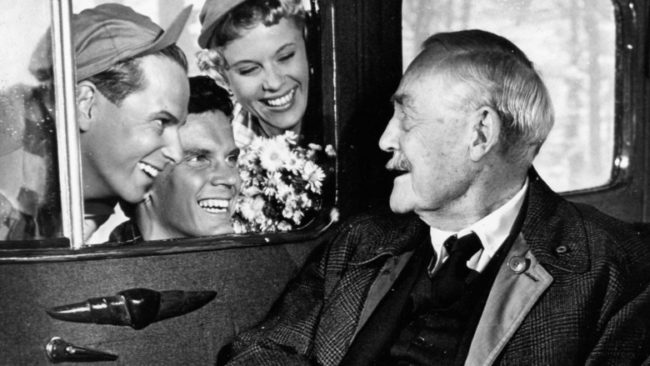
Dr. Isak Borg (Victor Sjöström 80 at the time of filming) has cut himself off from the world. Well, except for his housekeeper Miss Agda. It’s half his idea and half the fact that he is pretty much a dour ass. Instead of flying to Stockholm to accept an award, he decides to drive. As penance for whatever sins she has committed, his daughter-in-law Marianne (Ingrid Thulin) is along for the ride. After staying with the doctor for a month, she has atoned for her shortcomings and is heading home. Along the way, they encounter plenty of memories from his past.
HIs summer home, at the home of his equally distant and cold mother and a gas station where the attendants on hand compliment the doctor on his life’s work. Marianne starts the journey with unvarnished hatred and gradually thaws toward the old doctor.
Sjöström was a legend of Swedish cinema, dating back to the silent era, and his performance is brittle and resilient. The fact that he could put in a nuanced portrayal of such an initially unlikeable character is a testament to his talent. Ingmar Bergman can spin a tale of emotional heft and stark beauty. The fact that it is also a warm tale of optimism is the harder trick to pull of, which he does.
Polytechnique (2009)
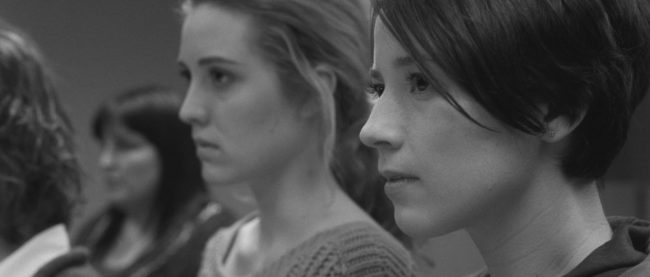
Brutal and raw and based on a true story, “Polytechnique” is a throbbing nerve of a film that is beautifully shot in black and white. The École Polytechnique Massacre happened in Canada back in 1989. After cornering a group of female engineering students, the killer informs the young women that he hated feminists and despised the idea of them pursuing careers in engineering. The media uproar that followed the massacre based on misogyny echoed for a very long time. Denis Villeneuve directed “Polytechnique” with enough skill to let some of the gorgeous filmwork lighten the severity of the situation. He did not step on the facts, over over-sell the horrors, he just told the story. I saw the Francophone dialogue version with English subtitles. Sometimes, it was difficult hearing such a musical language being used to deliver such harsh, insulting bile.
Run Lola Run (1998)

Lola’s (Franka Potente ) regular life is tossed on its head when she receives a phone call from her boyfriend Manni (Moritz Bleibtreu). He lost 100,000 Deutsche marks in a subway train. His bad luck gets even worse. The cash belongs to a very bad guy. The kind of guy who does not think twice about killing Manni unless he gets his money. Lola has twenty minutes to raise the funds and get it Manni or he will die in a quick, ugly fashion. The story retells itself with a different outcome each time. Worth viewing if only for the manner in which we learn the backstory
of the people Lola encounters. Tom Tykwer directs his screenplay with more than 1,500 transitions in 71 minutes. The edits, cuts, dissolves, fades and wipes. Potente could not wash her hair the entire seven weeks of the shoot due to the fact that the red dye would fade dramatically.
